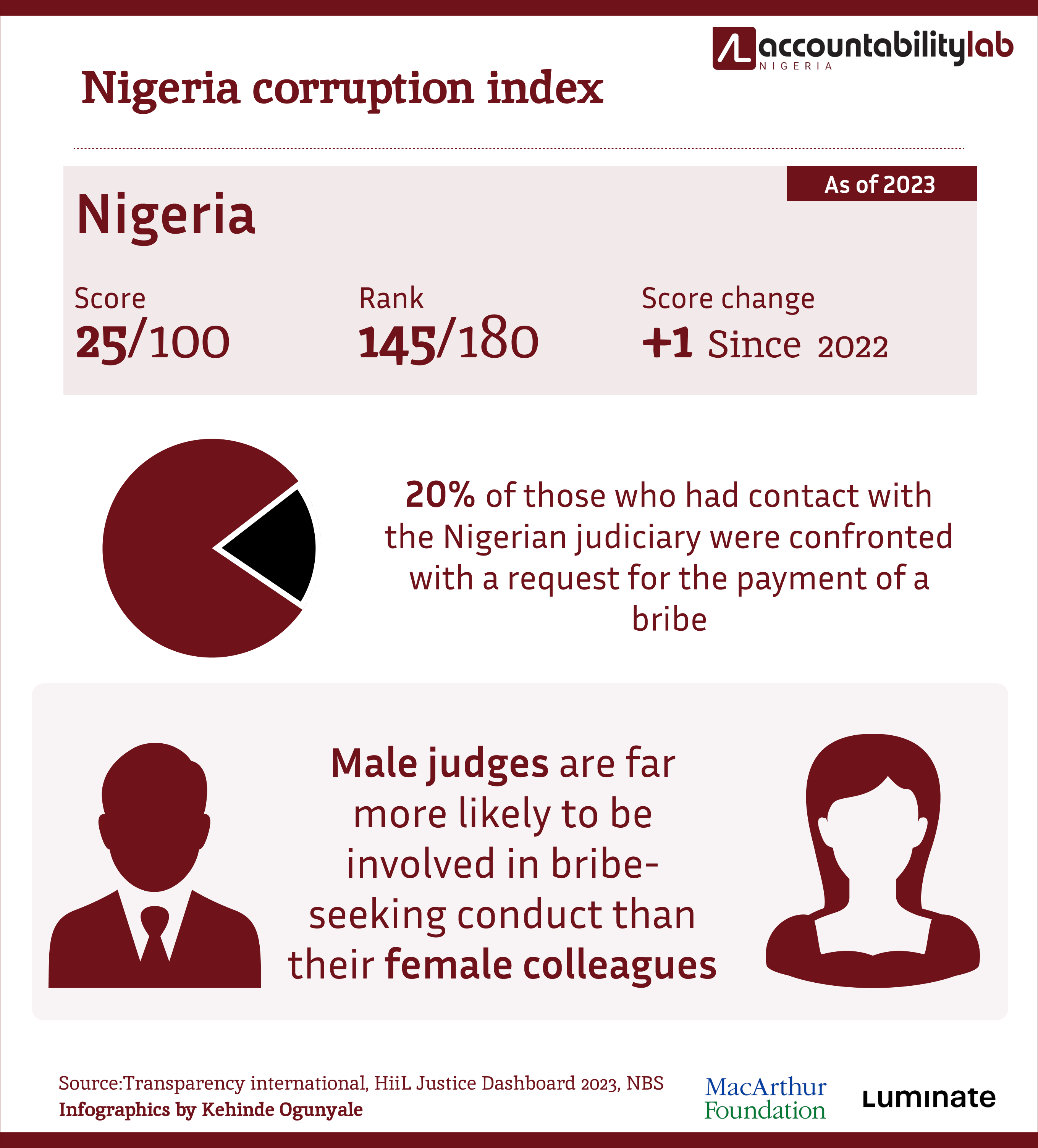NEWS
November 5, 2024

IN BRIEF
The Nigerian judiciary has often been scrutinized for corruption allegations, with accusations of bribery tainting the system. Lawyers and judges are frequently implicated in unethical practices compromising the foundational principles of justice and fairness. According to the 2023 UNODC Corruption In Nigeria research, judges and magistrates receive the highest amount of bribes out of all public officials in the country. Nigeria also ranked 120 out of 142 in the 2023 World Justice Project Index highlighting the persistent perception of deep-rooted [...]
SHARE
The Nigerian judiciary has often been scrutinized for corruption allegations, with accusations of bribery tainting the system. Lawyers and judges are frequently implicated in unethical practices compromising the foundational principles of justice and fairness. According to the 2023 UNODC Corruption In Nigeria research, judges and magistrates receive the highest amount of bribes out of all public officials in the country. Nigeria also ranked 120 out of 142 in the 2023 World Justice Project Index highlighting the persistent perception of deep-rooted corruption within the country’s public institutions and the lack of rule of law and justice. The immediate past Chief Justice of Nigeria (CJN), Justice Olukayode Ariwoola, has also acknowledged systemic challenges such as corruption, inefficiency, and undue influence undermining public confidence in the judiciary.
However, despite these concerns, few courageous individuals within the system have taken a stand against corruption. One such individual is Halima Yusuf Atiku, an Assistant Chief State Counsel at the Ministry of Justice, Gombe State. Her demanding job involves prosecuting cases ranging from homicide, armed robbery, to sexual assault, and her capacity to get justice, but it is her integrity that stands her out. As some of her colleagues have reportedly accepted bribes to amend charges or compromise cases, Halima remains resolute in her stance against corruption.
“These are some of the challenges we face, but for a few of us, when members of the public know that the case files are in our hands, they know there is nothing they can do; we do not compromise the case’’, Halima shares.
Her dedication to prosecuting cases within a reasonable timeframe stems from a recognition that justice delayed is not just denied but can have severe and lasting consequences for the lives involved. Halima’s diligent approach ensures that cases are handled with urgency and fairness rather than being prolonged for unethical gains.
“We also prosecute within a reasonable timeframe because people’s lives are at stake. I am diligent in our prosecution and attend to cases when due,” she notes. As with most people swimming against the tide of corruption in Nigeria, Halima’s reputation is not without challenges. She acknowledges facing significant pressure from those who perceive corruption as the norm. Her insistence on doing things by the book, despite facing backlash, shows her commitment to upholding the law and protecting the integrity of the judicial process.
“I’ve been tagged as inconsiderate because I refuse to bend the rules,” she admits, reflecting on her time at the Magistrate Court, where frequent interactions with litigants tested her resolve. She further described that the situation is different at higher courts, such as the Federal High Court and the Court of Appeals, where limited interactions reduce the avenues for pressure. Halima’s integrity is particularly tested when it comes to granting or denying bail—a process prone to abuse by some of her colleagues. While certain crimes like armed robbery and homicide are deemed non-bailable by law, Halima has seen cases where her colleagues, due to intentional negligence, grant bail by failing to file counter-affidavits, thus exploiting legal loopholes.
“Bail can either be applied for if a counter-affidavit doesn’t get filed or the accused gets assigned bail by the presiding judge, but there are different judges with different dispositions,” she states. “I have had colleagues who will intentionally refuse to file a counter-affidavit just so the criminal is granted bail. I do my homework, always filing a counter-affidavit no matter the offense, it’s the right thing to do.”
As a result of the country’s skewed justice, a Senior Advocate of Nigeria (SAN), Jibrin Okutepa, has blamed lawyers and judges for the loss of public confidence in the judicial system. Okutepa, who is a former member of the Legal Practitioners Disciplinary Committee (LPDC), said the country is in moral decay and decried the conduct of senior lawyers who compromise judges to get favourable verdicts.
Okutepa’s comments echo the sentiments of many Nigerians who have lost faith in a system they view as compromised at its core. But Halima and others like her have refused to bow to pressure and adhere to ethical principles.
With Nigerians bemoaning the fate of the judicial system in the face of corruption, the determination and resilience of actors like Halima have reiterated the call that justice should not be for sale. It is also a reminder that the actions of a few can transform an institution struggling under the weight of corruption. Halima Yusuf Atiku’s story also reveals the urgency of addressing the systemic issues within the judiciary. If the justice system is to regain the trust of the people, it will require more individuals like Halima who are willing to uphold integrity, no matter the cost.
This report is championed by Accountability Lab Nigeria and supported by the John D. and Catherine D. MacArthur Foundation and Luminate.
